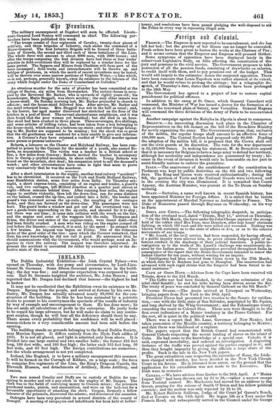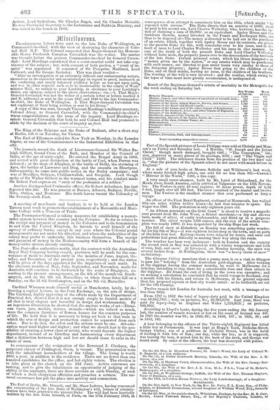fortign unit Ceuta'.
FRANCE.—The Empress is now reported to be convalescent, and she has left her bed ; but the gravity of her illness can no longer be concealed. Fresh orders have been given to hasten the works at the Chateau of Pan; and it seems certain that the Emperor and Empress will proceed thither. Some symptoms of opposition have been displayed lately in the subservient Legislative Body, on bills affecting the constitution of the .jwy and pensions to the civil service. The Government proposes to take possession of all the pension funds, consisting of drawbacks on salaries, to credit itself with them, and to pay pensions out of the budget. This would add largely to the estimates : hence the supposed opposition. There have been rumours that Louis Napoleon was rather alarmed at its extent, and that he would refuse to prolosig the sittings ; but a telegraphic de- spatch, of Thursdays date, states that the sittings have been prolonged to the 28th May. The Government has agreed to a project of law to restore capital punishment for political offences.
In addition to the camp at St. Omer, which General Canrobert will command, the Minister of War has issued a decree for the formation of a camp at the renowned plain of Satory, near Versailles. General Magnan will command the three divisions of the Army of Paris to be concentrated there.
Another campaign against the Kabyles in Algeria is about to commence.
Betanum.—An interesting discussion took place in the Chamber of Representatives on the 4th instant on the bill of the Brouckere Ministry for newly organizing the army. The Governmentpropose, that, exclusive of the militia, the regular troops shall amount to an effective force of 100,000 men. The Central Section had proposed only 80,000. Pending the adoption of the militia bill, it is proposed that the Crown shall call out the civic guards at its discretion. The vote for the war department is 32,180,000 francs. In making his statement, M. de Brouckere argued that it is necessary for Belgium to have a large army to defend her territory, although her neutrality and independence are guaranteed by treaty ; be- cause in the event of invasion it would only be honourable on her part to assist friendly nations to enforce the guarantee.
aux.—The anniversary of the establishment of the constitution in Piedmont was kept by public festivities on the 8th and two following days. The King and Queen were received enthusiastically., during the 8th, the garrison of Turin and the National Guards were reviewed, and in the evening the city was illuminated. It is remarked that Count Appony, the Austrian Minister, was present at the Te Deum on Sunday morning.
Spens.—Sartorius, a name well known in recent Spanish history, has been appointed Minister for Foreign Affairs. It is stated that he insists on the appointment of Marshal Narvaez as Ambassador to France. The Duke of Rianzares passed through Bayonne on Wednesday, on his way to Paris.
INDIA AND Cruta.—The following telegraphic despatch, in anticipa- tion of the overland mail, dated "Trieste, May 11," arrived on Thursday.
"On the 19th March, the force under SirJohn Cheape captured the strong- hold of the robber chief Mea Toon, near Donabew, after four hours' obstinate fighting, in which 102 rank and file were killed and wounded. Nothing was known with certainty as to the state of affairs at Ave, or as to the ulterior movements of our troops. "Mr. Lnard, of the civil service, had been Judges for having offered, if a public inquiry were allowed him, to prove certain guilty of in- famous conduct in the discharge of their judicial functions. A public in- vestigation as to the truth of Mr. Luard's challenge was unanimously de- sired by the Indian press. Great indignation prevailed throughout India in consequence of the report that the Home Government intended to renew the Indian Charter for ten years, without waiting for an inquiry. "Intelligence had been received from China down to the 27th March; at which date Sir G. Bonham had gone to Shanghai. The insurrection had advanced with such rapid strides that the Emperor had been forced to de- mand assistance."
CAPE OP GOOD HOPE. —Advices from the Cape have been received via Trieste, down to the 22d March.
"The Caffre war had been finished, by the complete submission of the rebel chief Sandilli ; he and his tribe having been driven across the Kei. The treaty of peace was concluded by General Cathcart on the 9th March."
UNITED STATES.—The Arctic arrived at Liverpool on Wednesday, bringing papers from New York to the 30th April.
President Pierce had presented two treaties to the Senate for ratifica- tion —one with the little state of San Salvador, negotiated by Mr. Squier, and long shelved by the Whig Government ; and the Tehuantepec treaty, conceding the route to Colonel Sloo. These acts were thought to be the first overt indications of a Monro tendency in the Pierce Cabinet. For the rest, all is quiet in the political world. There was a report that Mr. Lane, Governor of New Mexico, had taken possession of the Mecilla country, a territory belonging to Mexico ; and that there was likelihood of a rupture.
The papers report that the British Consul had remonstrated with General Cafiedo respecting the recent landing of slaves on the island of Cuba. He had come to the knowledge of a special case. Caned°, it is said, expressed incredulity, and ordered an investigation. A disgusting instance of the traffic was proved against the parties engaged in it; and then they bought impunity by giving the officials a large share of the profits. Such is the tale in the New York papers. The great extradition case respecting the surrender of Kane, the Irish- man charged with murder, has been decided in the New York Circuit Court in his favour. He is liberated from arrest, on the ground that the application for his extradition was not made to the Executive. The Irish were in ecstasies.
CANADA.—We have advices from Quebec to the 26th April. A" Maine Liquor Bill" had been thrown out by 32 to 28,—rather a narrow escape from Teetotal control. Mr. Mackenzie had moved for an address to the Queen praying for the release of Smith O'Brien and his fellow political convicts ; and the motion was only rejected by 32 to 26. Mr. Robert Baldwin Sullivan, Judge of the Court of Queen's Bench, died at Toronto on the 14th April. He began life as a Tory under Sir Francis Head, and subsequently served in the Council under Sir George Arthur, Lord Sydenham, Sir Charles Bagot, and Sir Charles 3letealfe. He was Provincial Secretary to the Lafontaine and Baldwin Ministry, and was raised to the bench in 1848.



























 Previous page
Previous page